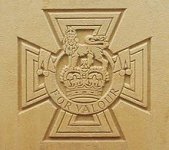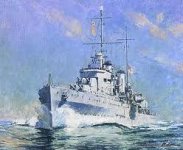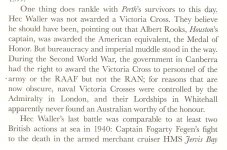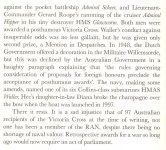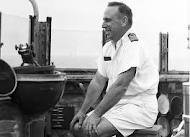Mitch is correct as I did start a thread about this in Jan 2011 (see below). I agreed with Mitch then and still agree with him now. This subject is again in the press here as the Govt is examining some specific cases. The Australian Navy has never received a VC and this often gets the press attention. Compared with some British Navy VC's it does appear some Australian's did deserve it based on similar circumstances. Wayne mentions HMAS Perth and her Captain.
Another example being examined is HMAS Yarra, a sloop, and her Captain Richard Rankin. On 3 MAR 1942 they were escorting three merchants in the Java sea when an overwhelming Japanese force of three cruisers and two destroyers appeared. They signalled their position, fired smoke and ordered the merchants to disperse. The CAPT then turned to face the enemy and steamed towards them. Only 13 of the 151 crew survived. This web page has some interesting background to the medal claims -
http://users.picknowl.com.au/~wjb718/hmas yarra-rankin.html
Whilst I believe some probably did deserve such an award I do not believe such awards can be issued by a Govt 70 years later. It appear the US MOH hads been awarded many years later but I am not aware of any such later VC award.
My previous thread starter was :
http://www.treefrogtreasures.com/fo...d-of-Bravery-Medal-long-after-the-event/page3
In another thread the subject of the retrospective award of medals was raised.
I mentioned Simpson who was an Aussie at Gallipoli who used a donkey to evacuate the wounded. He was put up for a Victoria Cross in WWI but it was not approved. Even quite recently people raised the matter of awarding Simpson a belated VC.
Mitch commented
"A brave man indeed as were many thousands but, I don't agree with this retrospective pressure for awards they were deliberated at the time and denied for failing to reach the criteria for the VC which, and rightly so, is high and other awards are given in such cases.
Modern society seems to want to retrospectively amend written history events decisions to readily etc and I think its wrong IMO"
I agree with Mitch but it is an interesting subject.
An Australian Senator recently submitted evidence in support of the claim to Department of Defence officials in Senate estimates hearings in Canberra.
“Of the 97 Victoria Cross medals awarded to Australians, none have been awarded to Navy personnel. 93 have been awarded to Army and 4 to Air Force personnel.
“Ordinary Seaman Teddy Sheean is widely regarded as having acted in a manner worthy of a Victoria Cross when, despite an order to abandon ship, he strapped himself to an anti-aircraft gun aboard the sinking HMAS Armidale in December 1942, continuing to fire his weapon, even as the ship sank beneath the waves.
“Teddy Sheean’s targets were Japanese aircraft which were continuing to shoot his fellow sailors while they were in the water awaiting rescue.
“He was successful in shooting down at least one Japanese Zero fighter aircraft, and possibly more.
“I believe that his actions deserve to be recognized with a posthumous Victoria Cross. It would be a fitting tribute for this fine Tasmanian and would begin to redress the lack or recognition for Royal Australian Navy personnel,” Senator Barnett said.
Senator Barnett also nominated other possible candidates to receive a posthumous VC, including Captain Hec Waller, lost on HMAS Perth in March 1942, Lieutenant Commander Robert Rankin, lost on HMAS Yarra in March 1942, and Captain Henry Stoker, commander of the submarine AE-2, which penetrated the Dardanelles at the start of the Gallipoli campaign in 1915. Notably, all of these candidates served in the Royal Australian Navy.
“There appears to be overwhelming evidence to support the claims for Captain Hec Waller and Ordinary Seaman Teddy Sheean,” Senator Barnett said.
“If Victoria Cross’s could be awarded to these two men to mark the Royal Australian Navy’s 100th Anniversary next year, that would be a wonderful gesture.
Senator Barnett also said it would be a great boost to morale in the Navy today".
The Senator is an idiot trying to use an Anniversary and current Navy morale to suppport the VC's. Note three of the four were Captains who went down with their ship and Sheehan is from the Senators state.. Sheehan's case is worthy but I have read that the ship should not have been where it was due to the danger in that area and the Navy did want to draw attention to the fact it should not have been where it was.
There has been ongoing debate over the award of medals to members of D Company who took part in the Battle of Long Tan in Vietnam (Australia's most famous battle in Vietnam). There was a quota system in effect at the time and only so many medals could be awarded per year. For example most senior officers got a DSO for being in Vietnam. The Company Commander got a Military Cross when many thought he should have got a DSO. After numerous reviews some of the officers recently had their medals "upgraded".
The Company Comander was recently awarded the Star of Gallantry (a medal that did not exist during Vietnam). His medal set is now on display in a museum and includes both medals. He is still campaigning to get awards
for some of his soldiers. Due to a change in the medals system the medals awarded in Vietnam (ie MC an MM etc) are no longer in use. It does appear more medals (and higher awards ) should have been awarded but it is hard to overcome the fcat that was the system at the time.
I know Bruce Crandell the Huey Pilot at the battle of Ia Drang (featured in Once Were Soldiers) did not receive his Congressional Medal of Honor until 40 years later.I believe after the American Civil; War some CMH winners
were asked to return them as too many were awarded (in a naval engagement).
I don't know any British examples.
Anybody know any other such cases ?
Regards
Brett


